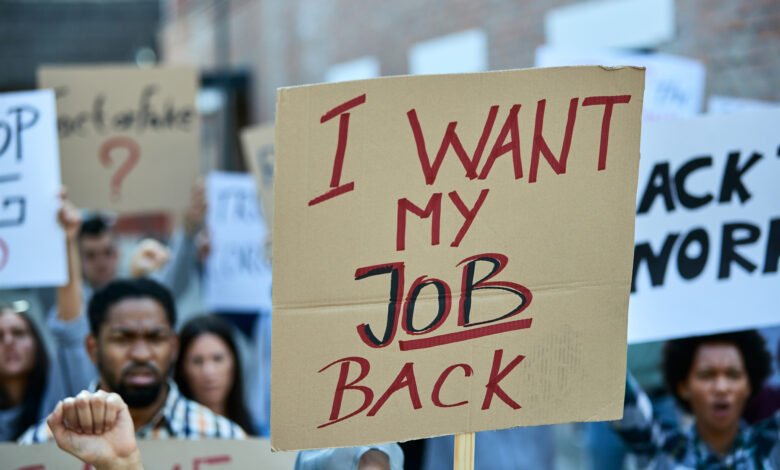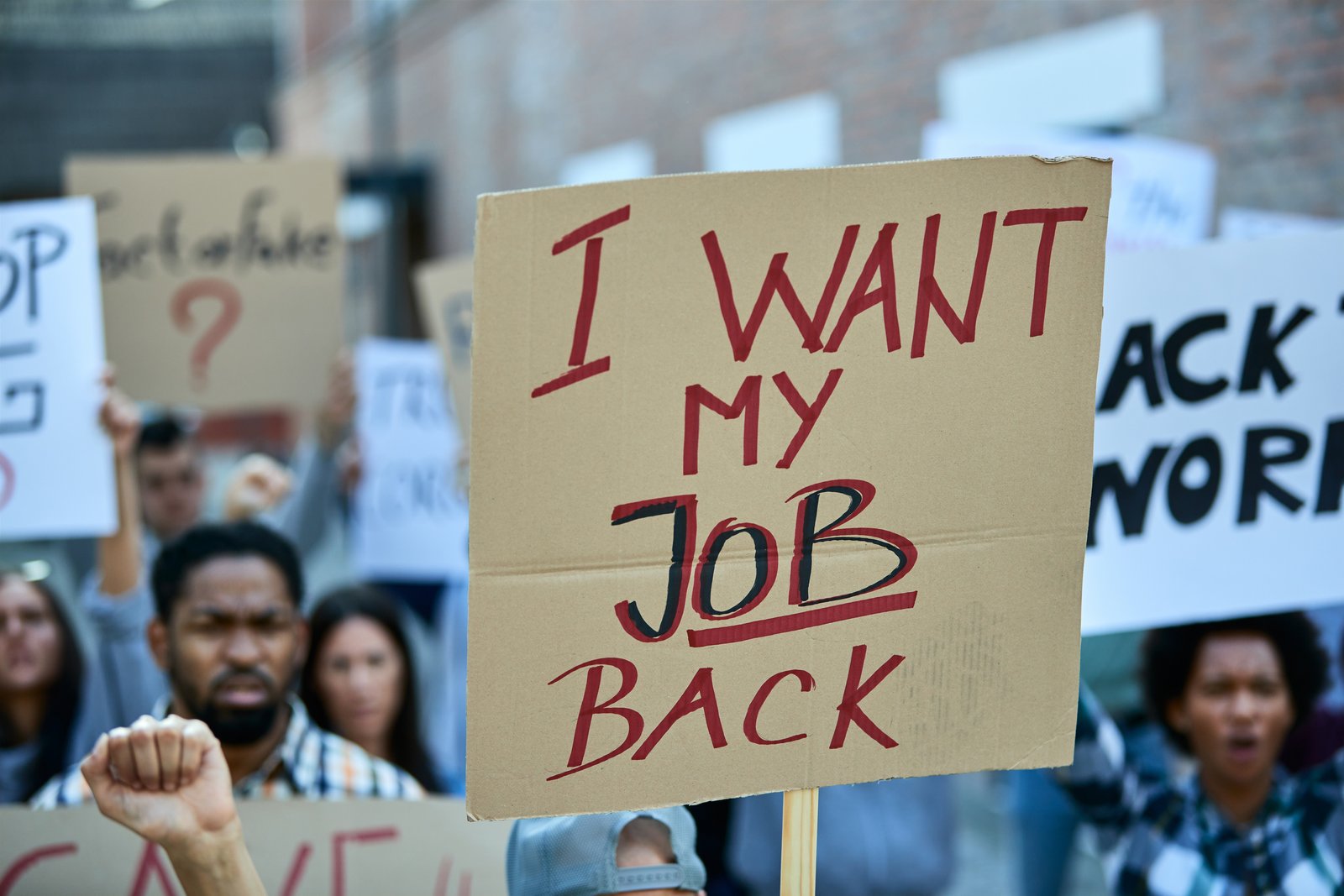
The Silent Crisis: Economic and Social Impact of 300,000 Job Losses Among Black Women
In an era of supposed economic recovery, a devastating and largely unnoticed crisis is unfolding. Nearly 300,000 Black women have been pushed out of the American workforce in recent months, a staggering figure that signals a profound economic and social failure. This is not a silent recession; it is a targeted economic blow that threatens to unravel decades of progress for Black women and their families.
This occurred even as the broader U.S. economy was adding jobs. This alarming trend is further highlighted by the fact that the unemployment rate for Black women has been volatile, rising to 6.1% in April 2025, significantly higher than the rate for white women (around 3%) and the national average. This crisis exacerbates the already stark racial wealth gap in the United States. According to the Federal Reserve, the median wealth for a White household is $285,000. For a Black household, it is just $44,890. The loss of hundreds of thousands of good-paying jobs for Black women will only widen this chasm.
A significant portion of these job losses has been concentrated in the public sector. Black women have historically been overrepresented in government jobs, which have offered more stability, better pay, and more robust benefits than the private sector. Black women constitute about 12% of all government employees but have seen a disproportionate share of recent cuts. For instance, Black women make up 28% of the Department of Education’s workforce, an agency that has seen substantial budget and staff reductions.
Economic Ripple Effects
The loss of 300,000 stable, primarily middle-income government positions has severe repercussions extending far beyond individual paychecks. Many black women anchor their households economically; thus, their unemployment significantly disrupts family financial stability, education opportunities, and long-term generational wealth-building.
Public sector jobs have been a critical pathway to the middle class for Black women, offering better pay and benefits than the private sector. A report from Ms. Magazine highlights that 22% of Black women in the labor force are government employees, compared to 15% of workers overall. These jobs are more likely to be unionized and provide access to health insurance and retirement plans, which are essential for long-term economic security.
The ripple effect of these job losses could potentially reduce GDP growth by billions annually, given the direct and indirect economic contributions Black women make through consumption, taxation, and community investment. Communities where Black women constitute an economic backbone will likely experience increased poverty rates, reduced consumer spending, and heightened vulnerability to financial crises.
Gendered Economic Perspectives
Economically, women—particularly Black women—face compounded disadvantages due to systemic gender and racial disparities. Black women have historically confronted wage gaps, employment discrimination, and reduced career advancement opportunities. Government jobs have traditionally provided Black women with more equitable salaries, benefits, and job security compared to the private sector.
The recent job losses strip away critical economic protections, deepening the gender-racial wealth gap and limiting opportunities for economic independence. With decreased access to well-paying, stable jobs, Black women may disproportionately face poverty, reliance on social services, and increased economic insecurity.
Disproportionately Affected Government Roles
The sectors most heavily impacted include administrative positions, social services, education, healthcare, and clerical jobs—fields where Black women are historically highly represented. These roles, often labeled essential during crises, paradoxically face the sharpest cuts during economic austerity.
Breakdown of Job Losses by Sector:
- Administrative and Clerical Positions: 35%
- Social Services: 25%
- Education: 20%
- Healthcare: 15%
- Other Government Roles: 5%
This breakdown illustrates the critical impact on foundational roles that sustain community infrastructure, highlighting areas in urgent need of intervention and support.
Geographic Impact of Job Losses
According to the Economic Policy Institute, states with the highest Black unemployment rates include Mississippi, Pennsylvania, and Ohio. Conversely, states like Nevada and Maryland have shown higher employment rates for Black women. The regional breakdown of job losses remains a critical area for further investigation and targeted policy interventions.
The job losses among Black women have disproportionately affected certain regions of the United States. The following geographic breakdown indicates where the impact has been most significant:
- Southern States: 40%
- Northeast States: 25%
- Midwest States: 20%
- Western States: 15%
The concentration of losses in the Southern states particularly emphasizes systemic vulnerabilities in these regions, requiring targeted regional economic policies and interventions.
For more on state-level data, see:
- CEPR: The Best Black Employment States — And How the Trump Administration is Hurting Them
- Economic Policy Institute: State unemployment by race and ethnicity
AI and Automation: Compounding the Crisis
The rapid integration of artificial intelligence and automation into government sectors has further exacerbated job insecurity for Black women. Roles traditionally occupied by Black women, such as administrative tasks, customer service, and clerical duties, are increasingly automated. AI’s expansion threatens long-term employment stability, suggesting future displacement risks will intensify without targeted intervention.
A report from the Institute for Women’s Policy Research (IWPR) found that women are more likely than men to work in jobs with a high risk of automation.
This “future of work” is not a distant threat; it is happening now. As companies and government agencies look to cut costs, they are increasingly turning to technology to replace human workers. Without retraining and education initiatives focused explicitly on empowering Black women, the technological shift risks deepening socioeconomic divides, reinforcing existing structural inequalities.
But we are a people of adaptation. We have always learned, pivoted, and remade ourselves to meet the demands of a changing world. This technological shift is not a death sentence for our careers; it is a call to action. It is a demand that we retool, upskill, and prepare to not just participate in the economy of the future, but to lead in it.
For more on automation and its impact on Black women, see:
- IWPR: Digitalization, Automation, and Older Black Women: Ensuring Equity in the Future of Work
- BET: They Let a Robot Take My Job: A Black Woman on the Real Cost of AI
Decriminalization of Sex Work: A Controversial Safety Net?
In response to shrinking economic opportunities, debates around decriminalizing sex work have resurfaced. Advocates argue this policy could provide safer, regulated, and economically viable avenues for women disproportionately impacted by job losses. Conversely, critics assert that such policies fail to address underlying socioeconomic disparities, potentially perpetuating vulnerability rather than providing meaningful economic empowerment.
While decriminalization could offer a form of economic autonomy, it must be accompanied by substantial investment in education, vocational training, and accessible healthcare to avoid reinforcing systemic exploitation or economic marginalization. What we cannot allow to happen is that continued decline in jobs for black women creates an influx in this economic sector.
Our Blueprint for Resilience: What We Must Do Now
Waiting for policy to save us is a luxury we cannot afford. Our history teaches us that our greatest strength lies within our own community. Here is a blueprint for how we, as Black women and as a collective Black community, can respond to this crisis with power and purpose.
- Activate Our Networks: Our social bonds are our economic currency. It is time to mobilize our sororities, church groups, alumni associations, and professional organizations like the National Council of Negro Women (NCNW) and the National Coalition of 100 Black Women. Let’s transform these networks into powerful job placement engines, sharing leads, providing referrals, and creating mentorship opportunities for those who have been displaced.
- Invest in Ourselves: The Skill-Up Imperative: We must aggressively pursue retraining and upskilling. Let’s seek out affordable online certifications in high-growth fields like project management, data analytics, cybersecurity, and digital marketing. Organizations like Black Girls CODE and local community colleges offer pathways into these lucrative sectors. Let’s form study groups and accountability circles to support each other through this educational transition.
- Pool Our Resources and Build Our Own Tables: The principle of “Ujamaa” (cooperative economics) has never been more relevant. It’s time to intensify our support for Black-owned businesses, circulating our dollars within our own community to create a self-sustaining economic ecosystem. Furthermore, let’s explore creating modern cooperative businesses—from childcare co-ops that free up mothers to re-enter the workforce, to tech consultancies that pool the talents of newly skilled professionals. Community investment clubs, or “tontines,” can provide the seed capital for these ventures.
- Demand Political Action: Our self-reliance must be paired with vocal, organized political advocacy. We must hold elected officials accountable at every level. We must demand an end to austerity budgets that disproportionately harm our community. We must advocate for targeted economic stimulus packages that prioritize the re-employment of Black women and robust investment in public sector jobs that serve our communities.
A Call for Partnership: Building a Stronger Future Together
While we mobilize from within, we must also demand that policymakers and corporate leaders meet us halfway. A truly equitable recovery requires:
- Targeted Investment: Directing federal and state funds toward job creation programs specifically designed for the hardest-hit demographics and sectors.
- Educational Grants: Funding accessible programs to equip Black women for the technology-driven roles of the future.
- Public Sector Protection: Reinforcing the value of government jobs and protecting them from indiscriminate cuts that weaken community infrastructure.
- Support for Black Entrepreneurship: Streamlining access to capital and resources for Black women to build and scale their own businesses.
Conclusion: We Are Our Own Recovery
The loss of 300,000 jobs is a staggering blow, but it is not a knockout. Black women have always been the architects of resilience. We have faced down economic exclusion, systemic barriers, and societal neglect, and we have not only survived—we have built, innovated, and led.
This is a moment of challenge, but it is also a moment of opportunity. It is an opportunity to deepen our community bonds, to acquire new and powerful skills, to build our own economic institutions, and to reaffirm our collective strength. We will weather this storm not by waiting for a lifeline, but by weaving one ourselves, thread by powerful thread. We are, and have always been, our own recovery.







One Comment